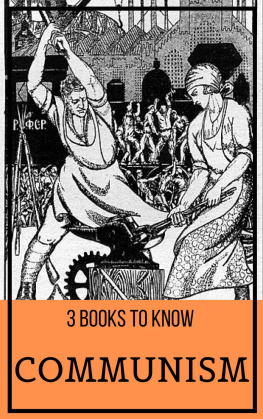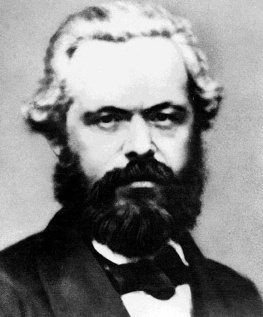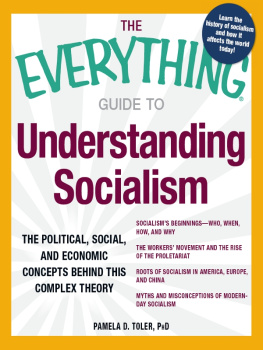Friedrich Engels - Socialism, Utopian and Scientific
Here you can read online Friedrich Engels - Socialism, Utopian and Scientific full text of the book (entire story) in english for free. Download pdf and epub, get meaning, cover and reviews about this ebook. City: Milano, year: 2015, publisher: Friedrich Engels, genre: Science. Description of the work, (preface) as well as reviews are available. Best literature library LitArk.com created for fans of good reading and offers a wide selection of genres:
Romance novel
Science fiction
Adventure
Detective
Science
History
Home and family
Prose
Art
Politics
Computer
Non-fiction
Religion
Business
Children
Humor
Choose a favorite category and find really read worthwhile books. Enjoy immersion in the world of imagination, feel the emotions of the characters or learn something new for yourself, make an fascinating discovery.

- Book:Socialism, Utopian and Scientific
- Author:
- Publisher:Friedrich Engels
- Genre:
- Year:2015
- City:Milano
- Rating:3 / 5
- Favourites:Add to favourites
- Your mark:
- 60
- 1
- 2
- 3
- 4
- 5
Socialism, Utopian and Scientific: summary, description and annotation
We offer to read an annotation, description, summary or preface (depends on what the author of the book "Socialism, Utopian and Scientific" wrote himself). If you haven't found the necessary information about the book — write in the comments, we will try to find it.
Socialism, Utopian and Scientific — read online for free the complete book (whole text) full work
Below is the text of the book, divided by pages. System saving the place of the last page read, allows you to conveniently read the book "Socialism, Utopian and Scientific" online for free, without having to search again every time where you left off. Put a bookmark, and you can go to the page where you finished reading at any time.
Font size:
Interval:
Bookmark:

In1900, when our publishing house had just begun the circulation ofsocialist books, we brought out the first American reprint of theauthorized translation of this work. The many editions required bythe growing demand have worn out the plates, and we are nowreprinting it in more attractive form.
Itwill be observed that the author in his introduction says that from1883 to 1892, 20,000 copies of the book were sold in Germany. Our ownsales of the book in America from 1900 to 1908 were not less than30,000.
Lastyear we published the first English version of the larger work towhich the author refers in the opening page of his introduction. Thetranslation is by Austin Lewis, and bears the title "Landmarksof Scientific Socialism" (cloth, $1.00). It includes the greaterportion of the original work, omitting what is presented here, andalso some of the personalities due to the heat of controversy.
FrederickEngels is second only to Karl Marx among socialist writers, and hisinfluence in the United States is only beginning.
C.H.K.
Thistook place about the time when the two sections of the Socialistparty in GermanyEisenachers and Lassallianshad just effectedtheir fusion, and thus obtained not only an immense increase ofstrength, but, what was more, the faculty of employing the whole ofthis strength against the common enemy. The Socialist party inGermany was fast becoming a power. But to make it a power, the firstcondition was that the newly-conquered unity should not be imperiled.And Dr. Dhring openly proceeded to form around himself a sect, thenucleus of a future separate party. It thus became necessary to takeup the gauntlet thrown down to us, and to fight out the strugglewhether we liked it or not.
This,however, though it might not be an over difficult, was evidently along-winded, business. As is well known, we Germans are of a terriblyponderous Grndlichkeit ,radical profundity or profound radicality, whatever you may like tocall it. Whenever anyone of us expounds what he considers a newdoctrine, he has first to elaborate it into an all-comprising system.He has to prove that both the first principles of logic and thefundamental laws of the universe had existed from all eternity for noother purpose than to ultimately lead to this newly-discovered,crowning theory. And Dr. Dhring, in this respect, was quite up tothe national mark. Nothing less than a complete "System ofPhilosophy," mental, moral, natural, and historical; a complete"System of Political Economy and Socialism"; and, finally,a "Critical History of Political Economy"three bigvolumes in octavo, heavy extrinsically and intrinsically, threearmy-corps of arguments mobilized against all previous philosophersand economists in general, and against Marx in particularin fact,an attempt at a complete "revolution in science"thesewere what I should have to tackle. I had to treat of all and everypossible subject, from the concepts of time and space to Bimetallism;from the eternity of matter and motion to the perishable nature ofmoral ideas; from Darwin's natural selection to the education ofyouth in a future society. Anyhow, the systematic comprehensivenessof my opponent gave me the opportunity of developing, in oppositionto him, and in a more connected form than had previously been done,the views held by Marx and myself on this great variety of subjects.And that was the principal reason which made me undertake thisotherwise ungrateful task.
Myreply was first published in a series of articles in the Leipzig"Vorwrts," the chief organ of the Socialist party, andlater on as a book: "Herrn Eugen Dhring's Umwlzung derWissenschaft" (Mr. E. Dhring's "Revolution in Science"),a second edition of which appeared in Zrich, 1886.
Atthe request of my friend, Paul Lafargue, now representative of Lillein the French Chamber of Deputies, I arranged three chapters of thisbook as a pamphlet, which he translated and published in 1880, underthe title: " Socialismeutopique et Socialisme scientifique ."From this French text a Polish and a Spanish edition were prepared.In 1883, our German friends brought out the pamphlet in the originallanguage. Italian, Russian, Danish, Dutch, and Roumaniantranslations, based upon the German text, have since been published.Thus, with the present English edition, this little book circulatesin ten languages. I am not aware that any other Socialist work, noteven our "Communist Manifesto" of 1848 or Marx's "Capital,"has been so often translated. In Germany it has had four editions ofabout 20,000 copies in all.
Theeconomic terms used in this work, as far as they are new, agree withthose used in the English edition of Marx's "Capital." Wecall "production of commodities" that economic phase wherearticles are produced not only for the use of the producers, but alsofor purposes of exchange; that is, as commodities ,not as use-values. This phase extends from the first beginnings ofproduction for exchange down to our present time; it attains its fulldevelopment under capitalist production only, that is, underconditions where the capitalist, the owner of the means ofproduction, employs, for wages, laborers, people deprived of allmeans of production except their own labor-power, and pockets theexcess of the selling price of the products over his outlay. Wedivide the history of industrial production since the Middle Agesinto three periods: (1) handicraft, small master craftsmen with a fewjourneymen and apprentices, where each laborer produces the completearticle; (2) manufacture, where greater numbers of workmen, groupedin one large establishment, produce the complete article on theprinciple of division of labor, each workman performing only onepartial operation, so that the product is complete only after havingpassed successively through the hands of all; (3) modern industry,where the product is produced by machinery driven by power, and wherethe work of the laborer is limited to superintending and correctingthe performances of the mechanical agent.
Iam perfectly aware that the contents of this work will meet withobjection from a considerable portion of the British public. But ifwe Continentals had taken the slightest notice of the prejudices ofBritish "respectability," we should be even worse off thanwe are. This book defends what we call "historical materialism,"and the word materialism grates upon the ears of the immense majorityof British readers. "Agnosticism" might be tolerated, butmaterialism is utterly inadmissible.
Andyet the original home of all modern materialism, from the seventeenthcentury onwards, is England.
"Materialismis the natural-born son of Great Britain. Already the Britishschoolman, Duns Scotus, asked, 'whether it was impossible for matterto think?'
Font size:
Interval:
Bookmark:
Similar books «Socialism, Utopian and Scientific»
Look at similar books to Socialism, Utopian and Scientific. We have selected literature similar in name and meaning in the hope of providing readers with more options to find new, interesting, not yet read works.
Discussion, reviews of the book Socialism, Utopian and Scientific and just readers' own opinions. Leave your comments, write what you think about the work, its meaning or the main characters. Specify what exactly you liked and what you didn't like, and why you think so.













